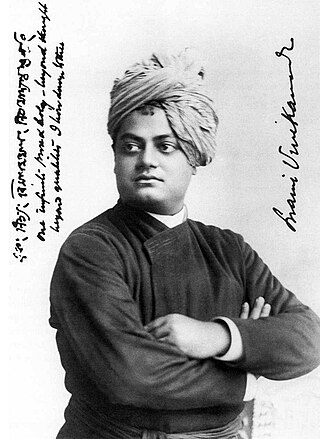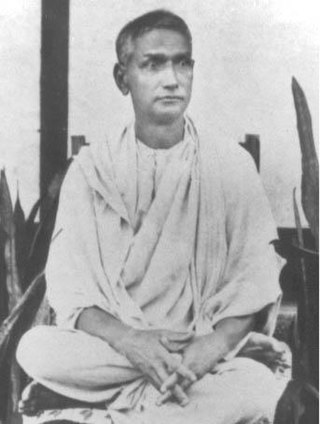| |||||
| Centuries: | |||||
|---|---|---|---|---|---|
| Decades: | |||||
| See also: | List of years in India Timeline of Indian history | ||||
Events in the year 1863 in India.
| |||||
| Centuries: | |||||
|---|---|---|---|---|---|
| Decades: | |||||
| See also: | List of years in India Timeline of Indian history | ||||
Events in the year 1863 in India.

Swami Vivekananda, born Narendranath Datta, was an Indian Hindu monk, philosopher, author, religious teacher, and the chief disciple of the Indian mystic Ramakrishna. He was a key figure in the introduction of Vedanta and Yoga to the Western world, and is the father of modern Indian nationalism who is credited with raising interfaith awareness and bringing Hinduism to the status of a major world religion in the late nineteenth century.

Thomas Bruce, 7th Earl of Elgin and 11th Earl of Kincardine,, often known as Lord Elgin, was a British nobleman, diplomat, and collector, known primarily for the controversial procurement of marble sculptures from the Parthenon and other structures on the Acropolis of Athens.

James Bruce, 8th Earl of Elgin and 12th Earl of Kincardine, was a British colonial administrator and diplomat. He served as Governor of Jamaica (1842–1846), Governor General of the Province of Canada (1847–1854), and Viceroy of India (1862–1863). In 1857, he was appointed High Commissioner and Plenipotentiary in China and the Far East to assist in the process of opening up China and Japan to Western trade. In 1860, during the Second Opium War in China, he ordered the destruction of the Old Summer Palace in Beijing, an architectural wonder with immeasurable collections of artworks and historic antiques, inflicting incalculable loss of cultural heritage. Subsequently, he compelled the Qing dynasty to sign the Convention of Peking, adding Kowloon Peninsula to the British crown colony of Hong Kong.

Ramakrishna Math and Ramakrishna Mission (RKM) is a spiritual and philanthropic organisation headquartered in Belur Math, West Bengal. The mission is named after the Indian Hindu spiritual guru and mystic Ramakrishna. The mission was founded by Ramakrishna's chief disciple Swami Vivekananda on 1 May 1897. The organisation mainly propagates the Hindu philosophy of Vedanta–Advaita Vedanta and four yogic ideals – Jnana, Bhakti, Karma, and Raja yoga. The mission bases its work on the principles of Karma Yoga, the principle of selfless work done with a dedication to God.

Victor Alexander Bruce, 9th Earl of Elgin, 13th Earl of Kincardine,, known as Lord Bruce until 1863, was a right-wing British Liberal politician who served as Viceroy of India from 1894 to 1899. He was appointed by Prime Minister Arthur Balfour to hold an investigative enquiry into the conduct of the Boer War in 1902 to 1903. The Elgin Commission was the first of its kind in the British Empire, and it travelled to South Africa and took oral evidence from men who had actually fought in the battles. It was the first to value the lives of the dead and to consider the feelings of mourning relatives left behind, and it was the first occasion in the history of the British Army that recognised the testimony of ordinary soldiery as well as that of the officers.

Belur Math is the headquarters of the Ramakrishna Math and Ramakrishna Mission, founded by Swami Vivekananda, the chief disciple of Ramakrishna Paramahamsa. It is located in Belur, West Bengal, India on the west bank of Hooghly River. Belur Math was established in January 1897, by Swami Vivekananda who was the disciple of Sri Ramakrishna. Swami Vivekananda returned back to India from Colombo with a small group of disciples and started work on the two one at Belur, and the others at Mayavati, Almora, Himalayas called the Advaita Ashrama. The temple is the heart of the Ramakrishna movement. It is notable for its architecture that fuses Hindu, Islamic, Buddhist, and Christian art and motifs as a symbol of unity of all religions. In 2003, Belur Math railway station was also inaugurated which is dedicated to Belur Math Temple.

Sister Nivedita was an Irish teacher, author, social activist, school founder and disciple of Swami Vivekananda. She spent her childhood and early youth in Ireland. She was engaged to marry a Welsh youth, but he died soon after their engagement.

Ramakrishna Paramhansa Deva had sixteen direct disciples who became monks of the Ramakrishna Order; they are often considered his apostles. In the Ramakrishna-Vivekananda movement, the apostles have played an important role. Apart from Swami Vivekananda, the direct disciples or apostles of Ramakrishna were as follows.

Vedanta Societies refer to organizations, groups, or societies formed for the study, practice, and propagation of Vedanta, the culmination of Vedas. More specifically, they "comprise the American arm of the Indian Ramakrishna movement" and refer to branches of the Ramakrishna Order located outside India.

Advaita Ashrama, Mayavati, is a branch of the Ramakrishna Math, founded on 19 March 1899 at the behest of Vivekananda, by his disciples James Henry Sevier, and Charlotte Sevier. Today it publishes the original writings of Vivekananda. As an ashram dedicated to the study and practice of Advaita Vedanta, no images or idols are worshipped there, not even of Ramakrishna; and no images were kept in the premises according to the Ashram ideals set by Vivekananda.
Events in the year 1872 in India.
Events in the year 1899 in India.
Events in the year 1862 in India.

Swami Vivekananda is a 1998 Indian biographical film directed by G. V. Iyer and produced by T. Subbarami Reddy. It took Iyer 11 years to finish the research work required for the film and to write the screenplay.

Ramakrishna Mission Home of Service is an Indian non-governmental organisation (NGO) located in Varanasi, established in 1900, and a branch of Ramakrishna Mission since 1902. It manages an education program on essential health issues in schools, slums and villages of Uttar Pradesh (India) thanks to auto-produced multimedia educational movies. It also gives health care and supplies free medicines to penniless people at its charitable hospital and two hospices.

Nirmalananda, born as Tulasi Charan Dutta in Calcutta, was a direct disciple of Ramakrishna, the 19th-century mystic and Hindu saint from India, and took Sanyasa from Vivekananda along with Brahmananda and others. He was initiated by Sri Ramakrishna, on which fact a few latter-day antagonists tried to cast doubt in the Bangalore Court, but into which question the Court refused to get into. Nirmalananda played a key role in establishing Ramakrishna Math and Mission chiefly in South India, in Kerala and Bangalore and Tamil Nadu and also in the USA, Burma and Bangladesh.

Swami Vivekananda was a Hindu monk from India. His teachings and philosophy are a reinterpretation and synthesis of various strands of Hindu thought, most notably classical yoga and (Advaita) Vedanta. He blended religion with nationalism, and applied this reinterpretation to various aspect's of education, faith, character building as well as social issues pertaining to India. His influence extended also to the west, and he was instrumental in introducing Yoga to the west.

Josephine MacLeod was an American friend and devotee of Swami Vivekananda. She had a strong attachment to India and was an active participant in the Ramakrishna Vivekananda movement. She was given the nicknames "Tantine" and "Jo Jo" by Vivekananda. She considered Swami Vivekananda to be her friend and helped him with his finances. MacLeod was not a sanyasin, unlike many others such as Sister Nivedita or Sister Christine. She was instrumental in spreading Vivekananda's message on Vedanta in the West. She made many contributions to the initial and the later phases of the development of the order of Ramakrishna and Vivekananda. She was a contributor to many causes espoused by Sister Nivedita, the most famous disciple of Vivekananda, including that of contributing financially towards the development of the Indian National Movement especially in Bengal and elsewhere in India.

Charlotte Sevier, also known as Mrs Sevier, was a direct disciple of Swami Vivekananda and was British in origin. She, together with her husband James Henry Sevier established the Advaita Ashrama, a branch of the Ramakrishna Order, in Mayavati in the Himalayas.

Constance Mary Bruce, Countess of Elgin, was a British aristocrat and Vicereine of India. She was the first wife of Victor Bruce, 9th Earl of Elgin, who served as Viceroy of India from 1894 to 1899.